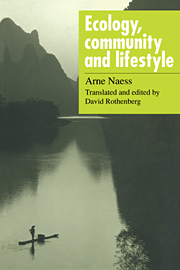Book contents
- Frontmatter
- Contents
- Translator's preface
- Introduction: Ecosophy T – from intuition to system
- 1 The environmental crisis and the deep ecological movement
- 2 From ecology to ecosophy
- 3 Fact and value; basic norms
- 4 Ecosophy, technology, and lifestyle
- 5 Economics within ecosophy
- 6 Ecopolitics within ecosophy
- 7 Ecosophy T: unity and diversity of life
- Bibliography
- Index
6 - Ecopolitics within ecosophy
Published online by Cambridge University Press: 13 October 2009
- Frontmatter
- Contents
- Translator's preface
- Introduction: Ecosophy T – from intuition to system
- 1 The environmental crisis and the deep ecological movement
- 2 From ecology to ecosophy
- 3 Fact and value; basic norms
- 4 Ecosophy, technology, and lifestyle
- 5 Economics within ecosophy
- 6 Ecopolitics within ecosophy
- 7 Ecosophy T: unity and diversity of life
- Bibliography
- Index
Summary
The ecological movement cannot avoid politics
All is politically relevant, but not all is politics
All our actions, and all our thoughts, even the most private, are politically relevant. If I use a clipped tea leaf, some sugar, and some boiling water, and I drink the product, I am supporting the tea and sugar prices and more indirectly I interfere in the works and capital conditions of the tea and sugar plantations of the developing countries. In order to heat the water, I may have used wood or electricity or some other kind of energy, and then I take part in the great controversy concerning energy use. I may use water from a private source or a public source, and in either case I participate in a myriad of politically burning questions of water supply. I certainly have a political influence daily in innumerable ways.
If I reflect on all these things along ecological lines and make my opinions known, I contribute to the strength of the politically conscious ecological movement. If I do nothing instead of drinking the tea I normally drink I may contribute to the difficulties of the developing countries because then their export becomes smaller. But perhaps not: I may think that they should not export tea but rather produce more food and therefore I make it easier for the politicians of the developing countries to change their economic policies in the direction of self-reliance.
- Type
- Chapter
- Information
- Ecology, Community and LifestyleOutline of an Ecosophy, pp. 130 - 162Publisher: Cambridge University PressPrint publication year: 1989



